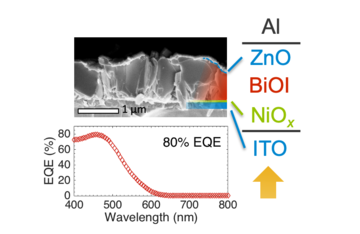Industry is calling for a range of renewable energy generation technologies to be developed to meet their diverse needs
Renewable energy generation is at the heart of the zero carbon energy transition. Across The University of Oxford, we have dedicated significant focus to the development of solar, wind and nuclear technologies which are revolutionising energy generation.
The University of Oxford is a world-leading hub for research into photovoltaics, from fundamental materials discovery and understanding, through to research aimed at tackling the challenges with manufacturing and device performance. Photovoltaics convert sunlight into clean electricity, and are one of the leading renewable energy generation technologies. Increasing the deployment of photovoltaics by an order of magnitude from current levels is critical to meeting net-zero greenhouse gas emissions targets across the world. However, the impact photovoltaics can have on society is not only at the utility scale, but also for indoor energy harvesting to power Internet of Things electronics, integration into the fabric of buildings to improve their sustainability, powering satellites and mobile vehicles in space, extending the range of electric vehicles, and in integration with agriculture (for example, integration with greenhouses). The wide variety of industries calls for a range of photovoltaic technologies to be developed to meet the diverse needs of these applications
Groups in Physics, Materials and Chemistry are developing technologies to meet these diverse needs. Oxford Materials have a long history developing silicon photovoltaics, which is the current industry-dominant technology for residential and utility-scale solar cells.
There is also substantial focus on discovering next-generation materials that can demonstrate improved efficiency, stability or sustainability. This draws upon computational modelling of materials, and linking together with ultrafast spectroscopy and advanced characterisation techniques. Oxford is a global leader in perovskite, hybrid and organic solar and hosts the ‘National Thin-Film Cluster Facility for Advanced Functional Materials’ where we pioneer novel manufacturing techniques. Recently, the groups in Oxford contributed to a roadmap on the current challenges and future opportunities in established and emerging photovoltaic materials, which can be read here.
The University of Oxford plays a significant role in advancing this field with internationally renowned groups researching offshore wind foundations, developing methods that have radically reduced installation costs for major wind farms. Oxford also researches tidal stream energy and complex wind farm aerodynamics, aiming to optimize turbine arrays and energy yield. The university’s work, often in partnership with industry leaders, directly contributes to the sector’s cost-effectiveness and scalability, including as part of the Supergen Offshore Renewable Energy Hub. Through our role in the Wind & Marine Energy Systems & Structures CDT, we are developing the next generation of leaders in the field.
Oxfordshire is a historic hub for nuclear research, particularly as a key partner to the Harwell Science and Innovation Campus and the Culham Centre for Fusion Energy (home to the JET and STEP projects). We focus on research in nuclear materials science and fission safety, underpinning life extension. In fusion we support the three different approaches of Oxfordshire companies, so cementing the region’s role at the forefront of global nuclear innovation.
Our Generation Case Studies

Materials for next-generation photovoltaics
Groups from Chemistry, Physics and Materials are developing a new generation of light-harvesting materials that can increase the ... Read more
Our Research Areas
Generation
Conversion
Distribution
Storage
Usage
More from ZERO Institute

About the ZERO Institute
We want to shape the transition to a just and fair global zero-carbon energy system, through research that unifies technology, policy, and people.

Our People
The ZERO Institute is a multi-disciplinary hub for zero-carbon energy research, bringing together academics from across the University of Oxford.

Latest News
Catch up on the latest news and events to see how ZERO is driving the transition to a zero-carbon energy system.